Learn about the three enigmatic figures in the Bible who escaped the clutches of death, leaving a legacy shrouded in divine mystery.

Three People Who Did Not Die in the Bible
As the saying goes, 'What goes up must come down,' but in the enigmatic tales of the Bible, this adage doesn't always apply.
You've probably heard about individuals who've lived remarkable lives, but have you ever pondered about those who didn't face the common fate of death according to biblical narratives?
Enoch and Elijah are well-known for their divine departures from Earth, bypassing death in a manner that leaves scholars and believers alike in awe.
Yet, there's a third figure shrouded in mystery, whose story invites you to explore the boundaries of life and the hereafter. Who could this be, and what might their story reveal about the mysteries of faith and eternity?
Key Takeaways
- Enoch's ascension signifies divine favor, positioning him as a figure of eternal life beyond death.
- Elijah's chariot of fire journey represents divine translation, emphasizing his role as a prophet with a unique end.
- 'The Mysterious Third' embodies the concept of biblical figures who challenge traditional narratives of death, adding depth to theological discussions.
- These individuals symbolize themes of hope, redemption, and the possibility of immortality, influencing religious and cultural interpretations.
The Enigma of Enoch
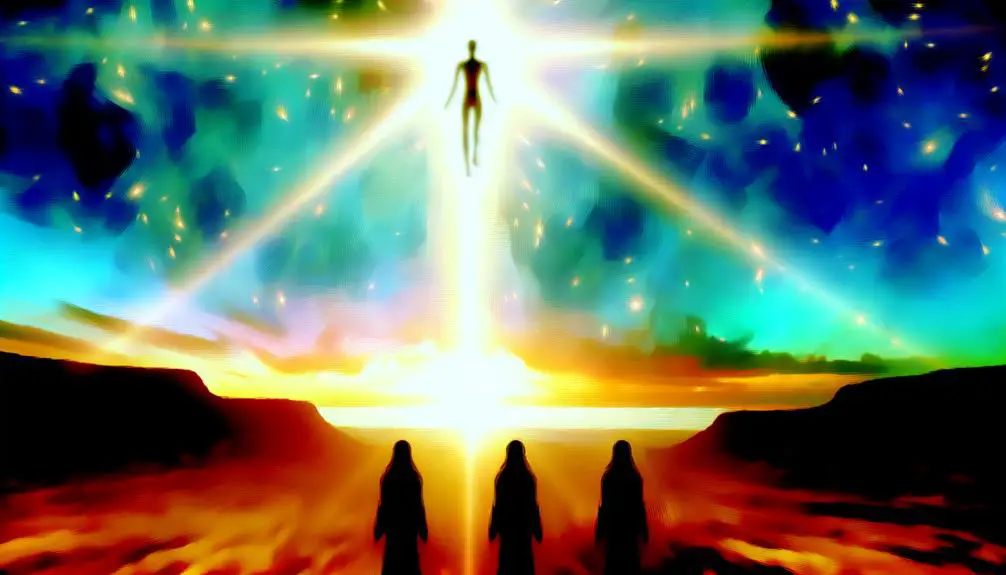
Among the intriguing figures in the Bible, Enoch stands out because he didn't experience death in the conventional sense, a fact that has sparked considerable debate and analysis among scholars. You'll find that his story, deeply woven into the fabric of biblical and apocryphal literature, offers a unique glimpse into ancient beliefs and the conceptualization of righteousness and divine favor.
Enoch's genealogy is critical to understanding his significance. As the seventh from Adam in the line of Seth, Enoch's placement in this lineage isn't merely chronological; it's symbolic, embodying a culmination of piety and closeness to God that his predecessors strove for. This genealogical context underscores the notion that Enoch's life was exemplary, a beacon of faith and righteousness in a lineage that the Bible painstakingly records for posterity.
The Apocryphal texts, while not canonical in all traditions, enrich the narrative surrounding Enoch, offering insights that the Hebrew Bible or Christian Old Testament do not. These texts portray Enoch not just as a man who walked with God but as a visionary, a prophet who was given insights into the divine workings of the universe. His journey, as detailed in these writings, suggests a figure who transcended the mortal coil through sheer piety and godliness, a theme that resonates with the esoteric and mystical traditions within Judaism and early Christianity.
In analyzing Enoch's story, you're delving into a rich tapestry of religious thought, one that bridges the gap between the earthly and the divine. His life, as recorded in both canonical and apocryphal sources, serves as a testament to the multifaceted nature of biblical interpretation and the enduring fascination with those who, according to scripture, transcended death itself.
Enoch's Ascension
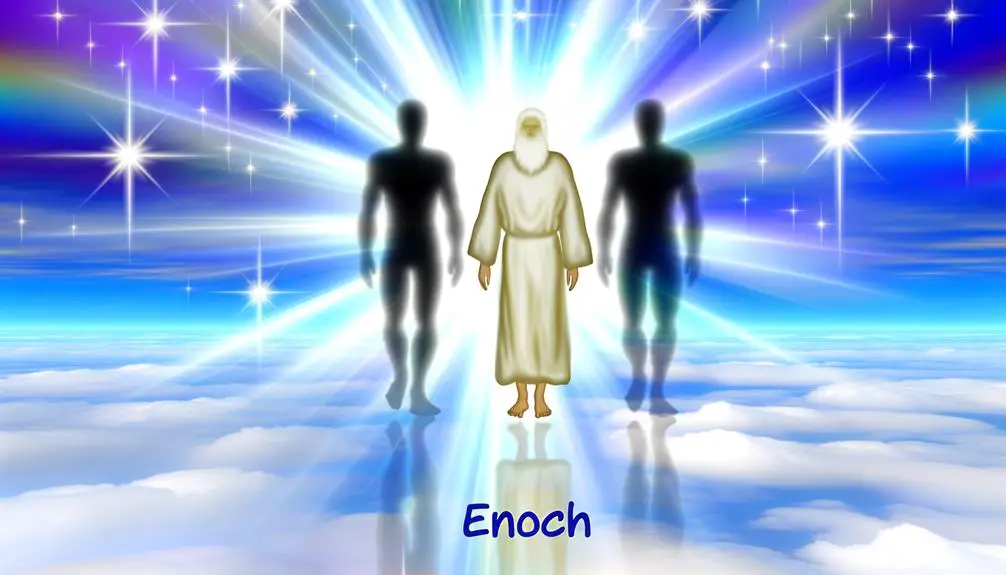
You must examine Enoch's life, marked by unwavering faith, to understand the unique circumstances of his ascension. This act of divine translation not only sets him apart in biblical narratives but also profoundly impacts his legacy and the myriad interpretations that follow.
Your analysis should focus on the interplay between Enoch's devout life and his extraordinary departure, highlighting how this event bridges human experiences with the divine.
Enoch's Faithful Life
Enoch's life, marked by unwavering faithfulness, uniquely culminated in his ascension to heaven without experiencing death. As Methuselah's father, Enoch's lineage is significant, anchoring his story within the broader narrative of humanity's early genealogy.
His life serves as a pivotal juncture in the biblical account, not merely for his role in Enoch's genealogy but for the exemplary faith he demonstrated. This faith, deeply rooted in his day-to-day existence, set him apart in a time when divine interaction was profoundly tangible yet selectively chronicled.
Enoch's walk with God, characterized by steadfast devotion and obedience, transcends mere ancestry, positioning him as a paradigm of faithfulness. His life narrative, devoid of the finality of death, underscores the profound implications of living in unwavering alignment with divine will.
Divine Translation Act
In the narrative of Enoch, his ascension stands as a divine translation act, marking a rare instance where faithfulness is rewarded by bypassing the experience of death. This event not only highlights the unique status Enoch holds but also opens up avenues for exploring mythological parallels across various cultures.
Such parallels often feature figures who, due to their righteousness or divine favor, are taken from the earth without undergoing death, illustrating a motif that resonates with human desires for transcendence and immortality. The cultural significance of Enoch's translation extends beyond the biblical text, influencing theological discourse and artistic representations. It serves as a testament to the power of faith and the possibility of divine intervention in the lives of the devout.
Legacy and Interpretations
Through the ages, interpretations of Enoch's ascension have significantly shaped theological and cultural perspectives on divine-human relations. This narrative has been pivotal in discussions about mortality, divinity, and the potential for humans to transcend their earthly existence. The cultural impact of Enoch's story extends beyond religious texts, influencing literature, art, and modern spiritual discourse. Its modern relevance is found in ongoing debates about the nature of righteousness and the possibility of achieving a divine state.
Aspect |
Influence |
|---|---|
Theological |
Reimagines the boundary between divine and human |
Cultural |
Inspires art, literature, and mythology |
Modern Relevance |
Fuels discussions on righteousness and transcendence |
Analyzing Enoch's ascension invites a deeper understanding of how ancient narratives continue to shape contemporary thought and spiritual aspirations.
Elijah: The Fiery Departure
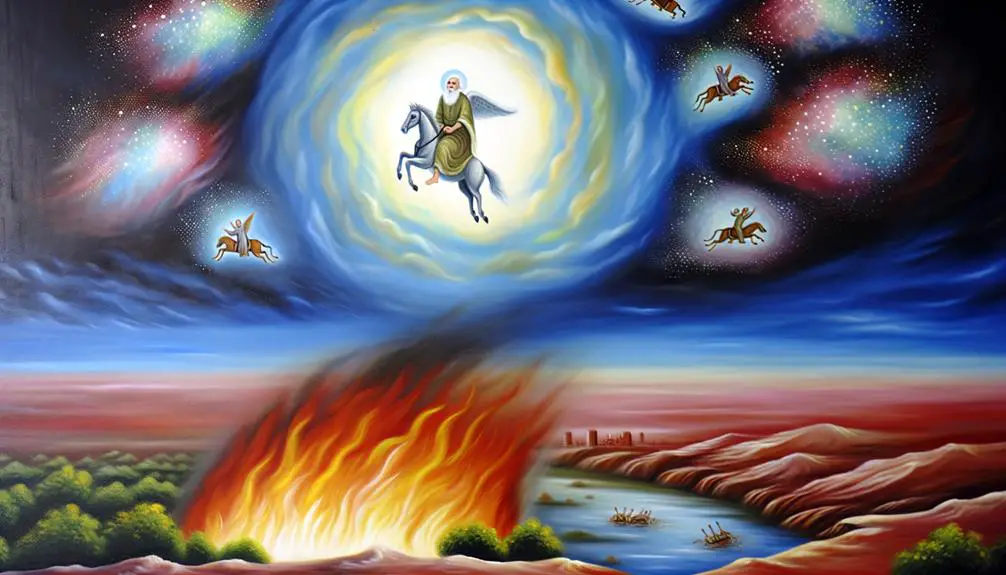
Elijah's departure from Earth, marked by a fiery chariot and whirlwind, stands as a unique event in biblical narratives, illustrating a direct ascent to heaven without experiencing death. This moment encapsulates not only the culmination of Elijah's earthly ministry but also underscores the exceptional nature of his relationship with the divine. Throughout his life, Elijah's journey was distinguished by a profound prophet's mentorship and the performance of miraculous signs, setting a precedent for divine-human interaction that was unparalleled among his contemporaries.
Elijah's role as a prophet was characterized by his unwavering commitment to Yahweh in the face of widespread apostasy. His mentorship extended to Elisha, to whom he passed the mantle of prophetic leadership in a symbolic act that underscored the continuity of divine mission. This transition of leadership, while pivotal, didn't diminish the significance of Elijah's own contributions. His miraculous signs, including the confrontation at Mount Carmel and the raising of the widow's son, validated his prophetic authority and underscored the power of God working through him.
The narrative of Elijah's departure, therefore, isn't merely an account of an extraordinary exit from the earthly realm. It serves as a testament to the life and legacy of a prophet whose ministry was marked by fervent devotion, divine encounters, and the power to effect change through faith. By ascending to heaven in such a dramatic fashion, Elijah's story invites reflection on the nature of divine favor and the ways in which faithfulness is rewarded beyond the confines of mortal existence.
The Chariot of Fire
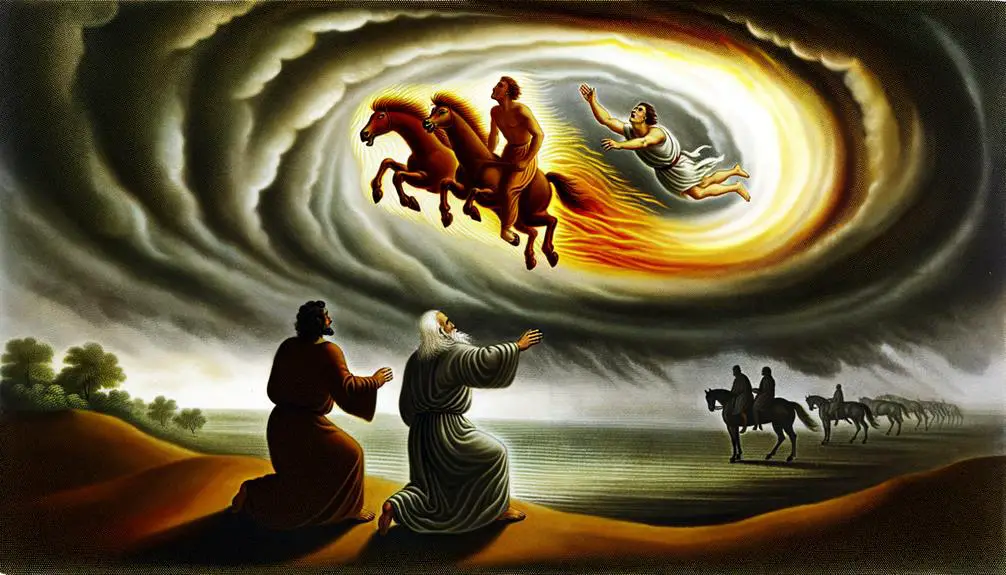
One can't discuss Elijah's ascent to heaven without delving into the significance of the chariot of fire, a symbol rich in divine imagery and prophetic power. This extraordinary event, where heavenly vehicles become the means for a prophet's transition from earthly to divine realms, encapsulates a profound theological message. The chariot of fire not only signifies divine intervention and approval but also serves as a vivid representation of God's power and majesty.
Heavenly vehicles, such as the chariot of fire, aren't mere modes of transport in biblical narratives; they symbolize the divine presence and the extraordinary means through which God communicates with and uplifts His chosen ones. This imagery is replete with prophetic symbolism, suggesting a connection between divine will and prophetic mission. Elijah's journey in the chariot of fire to heaven underscores his role as a pivotal prophet in the biblical tradition, whose life and mission were directly guided by divine will.
The depiction of the chariot of fire also invites reflection on the nature of divine encounters and the ways in which the divine realm intersects with the earthly. It suggests that divine revelation and intervention can transcend ordinary means, employing symbols of power and transcendence to convey God's purposes.
In analyzing the chariot of fire, one appreciates its role as a bridge between the human and the divine, a vehicle of prophetic ascension that underscores the close relationship between God and His prophets. This event, rich in symbolism, not only highlights Elijah's unique status but also serves as a testament to the enduring power of prophetic symbolism in conveying theological truths.
The Mysterious Third
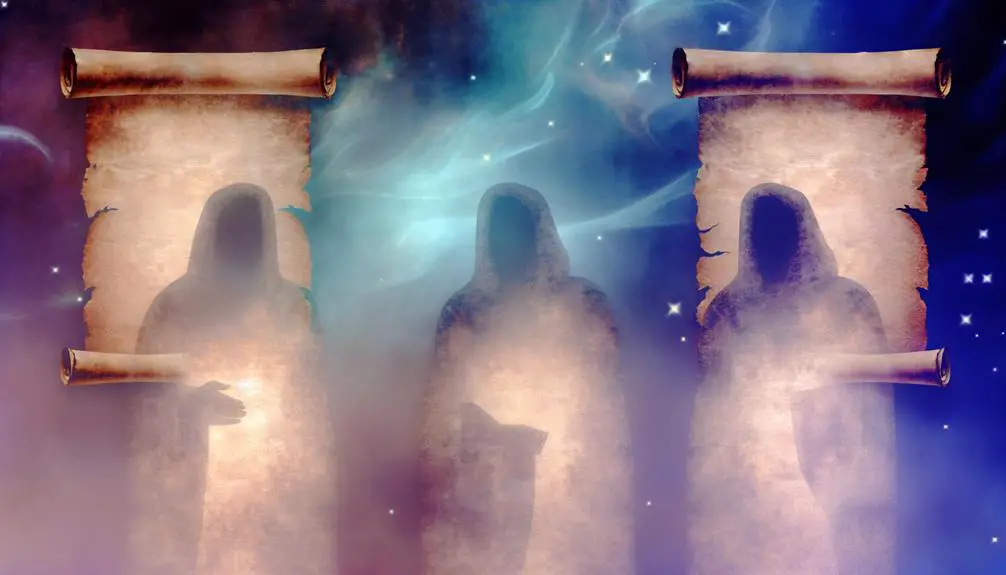
Exploring the narrative of Elijah's ascent, we encounter 'The Mysterious Third,' a figure shrouded in biblical ambiguity and profound theological implications. Unlike Elijah and Enoch, whose departures from Earth are vividly described in the scriptures, this enigmatic entity represents a broader category of unexplained disappearances and biblical immortals, challenging our understanding of life, death, and divine intervention.
To comprehend the significance of 'The Mysterious Third,' consider the following aspects:
- Unexplained Disappearances: Unlike the clear narratives surrounding Elijah and Enoch, 'The Mysterious Third' encompasses those individuals in biblical texts whose fates are left ambiguous. Their stories often lack a definitive conclusion, leaving scholars and theologians to ponder their ultimate destinies.
- Biblical Immortals: This category implicitly includes figures who, by virtue of their undefined departures, may be considered as not having experienced death in the traditional sense. Their existence raises intriguing questions about the nature of immortality and its representation in religious texts.
- Theological Implications: The ambiguity surrounding 'The Mysterious Third' invites a deeper exploration of faith, the afterlife, and divine will. It challenges readers to consider the possibility of other forms of existence beyond our earthly comprehension, adding a layer of mystery to the biblical narrative.
Beyond Death's Reach
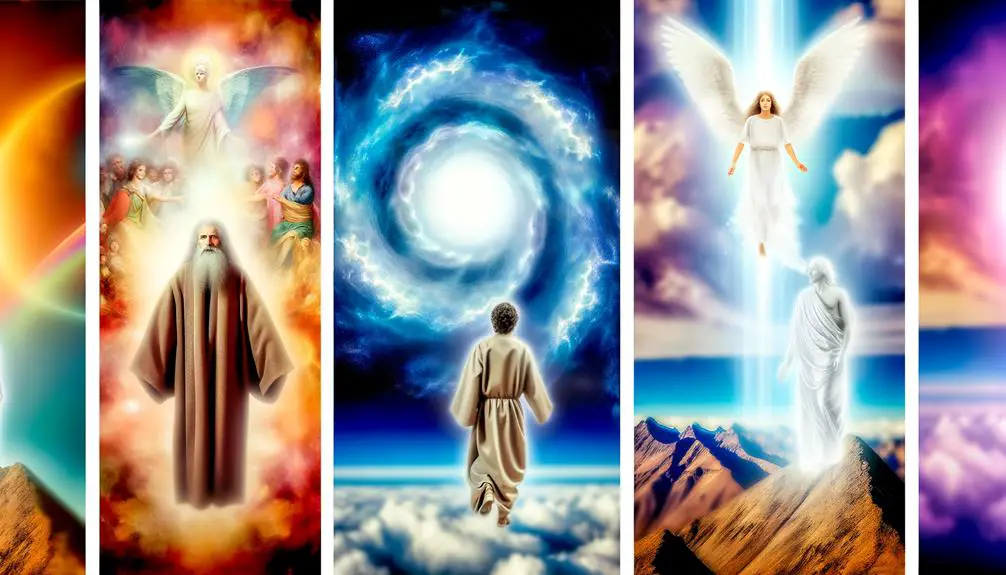
You'll find that the concept of eternal figures in the Bible isn't only fascinating but deeply rooted in theological discourse.
The examination of immortality in scripture reveals a complex interplay between divine intention and human interpretation.
This segment explores how certain individuals were positioned beyond death's reach, offering insights into the broader implications of eternal life.
Eternal Figures Explained
Several figures within the Biblical narrative are distinguished by their unique status of having never experienced death, presenting a fascinating aspect of religious literature that merits close examination. Immortality myths and their eternal significance within the context of these narratives offer a profound insight into the values and beliefs of ancient cultures.
- Immortality Myths: These stories serve as foundational elements, illustrating how cultures perceive life, death, and the divine.
- Eternal Significance: The undying nature of these figures symbolizes themes of hope, redemption, and divine favor, reflecting deep spiritual and moral lessons.
- Cultural Impact: Their stories have transcended time, influencing art, literature, and theology, highlighting humanity's enduring fascination with the concept of living beyond death.
Immortality in Scripture
Delving into the realm of the divine, scripture presents a select few who transcend death, offering a window into the concept of immortality within ancient religious texts. These narratives fuel mortality debates, as scholars dissect the meanings and implications of such exceptional destinies.
Scriptural ambiguities further complicate these discussions, as texts often leave room for interpretation regarding the true nature of these figures' existence beyond the mortal coil. Analyzing these accounts requires a careful consideration of historical context, theological intent, and the symbolic significance attributed to immortality.
Ultimately, these stories serve not only to fascinate but also to challenge one's understanding of life, death, and what may lie beyond, within the framework of religious belief and mythology.
Interpretations and Beliefs
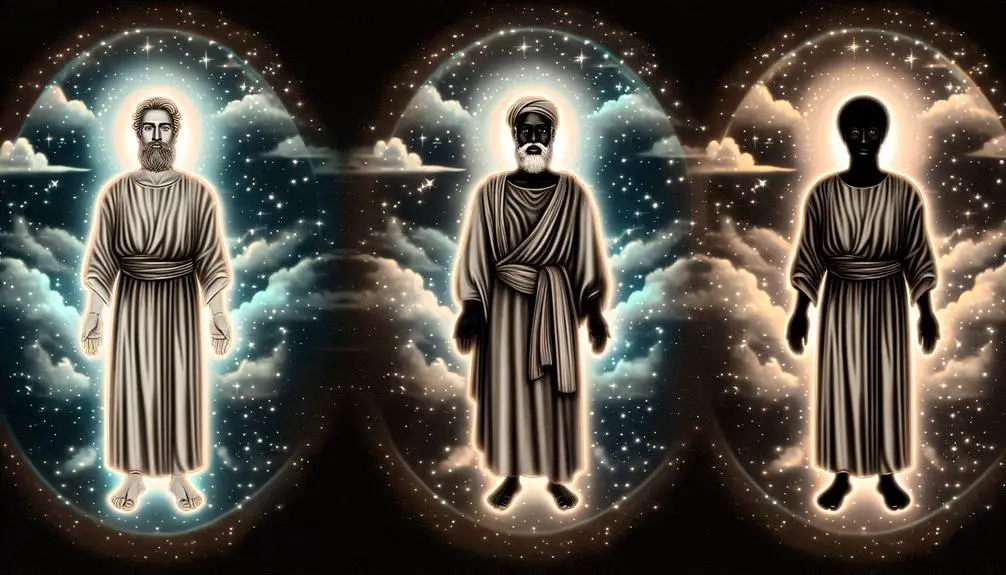
Throughout history, interpretations and beliefs regarding individuals in the Bible who didn't experience death have varied widely among scholars and religious communities. These discussions have often led to significant cultural impacts and spurred theological debates. Here, let's explore how these varied perceptions have manifested:
- Cultural Impacts: In different cultures, stories of immortality in the Bible have been adapted and integrated into local beliefs and traditions. This hasn't only enriched cultural narratives but also influenced art, literature, and folklore. For instance, the tales of Enoch and Elijah have inspired countless works, from medieval paintings to modern novels, showcasing the profound influence these biblical accounts hold beyond the confines of religious texts.
- Theological Debates: Theological interpretations of immortality have led to diverse viewpoints within religious communities. Debates have centered around the nature of the soul, the afterlife, and the concept of eternal life. These discussions often reflect broader theological principles and can vary significantly between different denominations and sects. For example, the idea of bodily assumption into heaven has been a point of contention and discussion among theologians, highlighting the complexity of scriptural interpretation.
- Scholarly Analysis: Scholars have approached the topic from various angles, including historical, literary, and anthropological perspectives. Their analyses contribute to a deeper understanding of the texts, offering insights into the sociopolitical context of the times and how these stories might've been interpreted by contemporary audiences. This scholarly work underscores the multifaceted nature of biblical narratives and their interpretations.
Frequently Asked Questions
How Have the Stories of Enoch and Elijah Influenced Modern Religious Practices and Rituals?
You might find that Enoch and Elijah's heavenly ascensions have deeply influenced modern religious practices and rituals.
Their stories, rich in prophetic significance, inspire faith communities to strive for spiritual purity and readiness for divine encounters.
These narratives encourage the belief in a life beyond death and the possibility of being chosen for a direct journey to the divine, shaping rituals that emphasize preparation, holiness, and the hope of transcending earthly limits.
Are There Any Archaeological Findings or Historical Records Outside the Bible That Corroborate the Accounts of Enoch, Elijah, or the Mysterious Third Person Not Dying?
You're diving into a world where tales defy death itself, searching for elusive truths behind these ancient narratives. Scientific skepticism greets you at every turn, as no archaeological findings or historical records outside the Bible corroborate the extraordinary claims about these individuals cheating mortality.
Yet, this inquiry opens fascinating doors to exploring mythological parallels, offering a scholarly, analytical gaze into how these stories resonate or diverge across cultures and epochs.
How Have Different Cultures and Religions Outside of Judaism and Christianity Interpreted the Tales of Enoch and Elijah?
You'll find that cultures and religions beyond Judaism and Christianity have often embraced the stories of Enoch and Elijah through cultural assimilation, weaving these narratives into their own mythologies. There are striking mythological parallels, as many traditions feature figures who transcend death or ascend directly to a divine realm.
Scholars analyze these tales, noting how they reflect universal themes of immortality, divine favor, and the porous boundaries between the earthly and the divine.
Have There Been Any Notable Literary Works or Pieces of Art Inspired by the Stories of Enoch, Elijah, and the Mysterious Third Figure?
Ironically, you might think stories as ancient as these wouldn't inspire modern creativity, yet Enoch's legacy and Elijah's miracles have captivated artists and writers for centuries.
Their tales have been woven into countless literary works and pieces of art, reflecting an enduring fascination.
Analyzing these contributions reveals a deep, scholarly appreciation for how ancient narratives continue to shape our cultural and artistic landscapes, underscoring their timeless relevance and appeal.
In What Ways Have the Narratives of Enoch, Elijah, and the Mysterious Third Been Used in Contemporary Discussions or Teachings About Morality and Spirituality?
In contemporary discussions on morality and spirituality, the narratives of Enoch, Elijah, and the mysterious third figure often highlight eternal implications and moral ambiguity.
You'll find these stories used in various teachings to explore the complexities of ethical decisions and spiritual journeys.
They serve as a rich source for examining how ancient texts can inform modern ethical dilemmas and spiritual inquiries, encouraging a deeper analysis of moral complexities and spiritual beliefs.
Conclusion
In analyzing the narratives of Enoch, Elijah, and the less prominently discussed cases of transcendence beyond mortal demise in the Bible, one discerns a pattern that challenges our conventional understanding of life and death.
These accounts, veiled in divine mystery, underline the adage 'where there's a will, there's a way,' suggesting a profound spiritual will at work, beyond human comprehension.
This exploration not only enriches our theological perspectives but also invites a deeper contemplation of the metaphysical boundaries that define our existence.

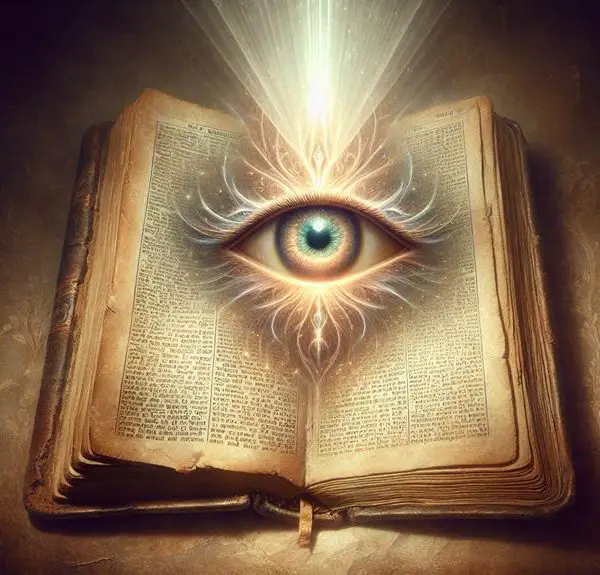
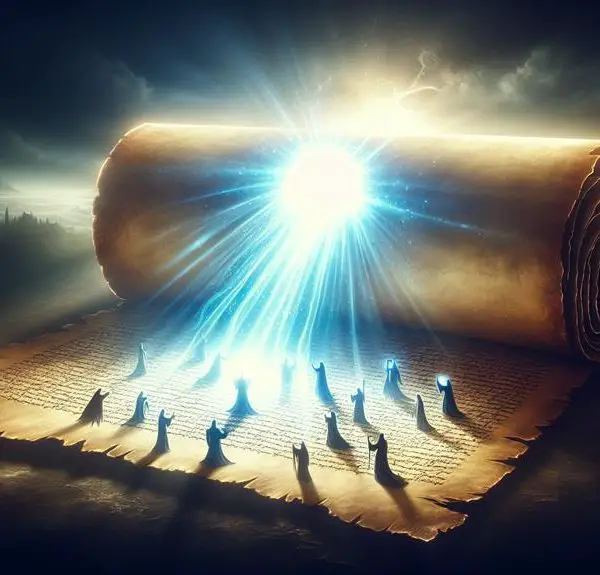
Sign up